Featured
 Biden calls out ‘poison’ of white supremacy in address at Mother Emanuel in S.C. By Adelle M. Banks / Religion News Service
Biden calls out ‘poison’ of white supremacy in address at Mother Emanuel in S.C. By Adelle M. Banks / Religion News Service
President Joe Biden, taking his 2024 reelection campaign to South Carolina, denounced the white supremacy that he said led to deadly violence at Mother Emanuel African Methodist Episcopal Church almost nine years ago.
“The Word of God was pierced by bullets and hate and rage, propelled by not just gunpowder, but by a poison, a poison that has for too long haunted this nation,” he said in an address Monday (Jan. 8) at the historically Black church where nine people died in 2015 at the hands of a gun-carrying white supremacist they had welcomed to their Bible study.
“What is that poison? White supremacy. All it is is a poison. Throughout our history, it’s ripped this nation apart. This has no place in America. Not today, tomorrow or ever.”
Related: Both Biden and Trump speeches make the stakes clear: 2024 is a battle over white supremacy. By Amanda Marcotte / Salon
Related: What if Joe Biden Is Actually Right About 2024? By Jesse Wegman / NYT
Related: Biden Is Trying to Jolt Us Out of Learned Helplessness About Trump. By Michelle Goldberg / NYT
Political / Social
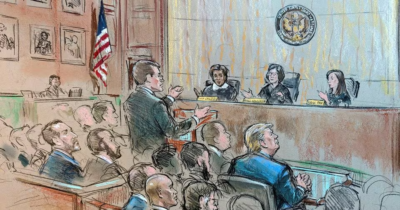 Trump warns of ‘bedlam,’ declines to rule out violence after court hearing. By Isaac Arnsdorf / Wash Post
Trump warns of ‘bedlam,’ declines to rule out violence after court hearing. By Isaac Arnsdorf / Wash Post
The former president spoke after his lawyers argued he should be immune from prosecution for trying to overturn the 2020 election. Image by Reuters
Speaking to reporters after an appeals court hearing in which Trump’s lawyers said he should be immune from prosecution for trying to overturn the 2020 election, Trump claimed without evidence that he was being prosecuted because of polls showing him leading President Biden. He warned that if the charges succeed in damaging his candidacy, the result would be “bedlam.” Read more
Related: Imagine if Trump Loses. By Jamelle Bouie / NYT
Related: Donald Trump is possessed by a fascist mania. By Chauncey Devega / Salon
Related: The question of Trump’s corruption should be front and center. By Jennifer Rubin / Wash Post
 Rachel Maddow Boldly Explains Why Republicans Are As Big A Problem As Trump. By Ron Dicker / HuffPost
Rachel Maddow Boldly Explains Why Republicans Are As Big A Problem As Trump. By Ron Dicker / HuffPost
During the segment, Maddow highlighted a New York Times article published earlier in the day that compared coup attempts by Trump supporters on Jan. 6, 2021, and loyalists to former Brazilian President Jair Bolsonaro on Jan. 8, 2023, after both men lost presidential elections. The article noted how both stoked their allies into violence with false claims of election fraud, but the aftermaths were starkly different.
Bolsonaro was shunned by right-wing leaders who accepted the vote tally and banned from running for office until 2030 by a Brazilian court. Trump, meanwhile, remains the de facto head of the GOP and is poised to become the party’s nominee again. Read more
Related: How Hillsdale Got Mixed Up in the 2020 Election Plot. By Danny Hakim / NYT
Related: Why more Black conservatives don’t join the GOP. By Theodore R. Johnson / Wash Post
 DEI efforts are under siege. Here’s what experts say is at stake. By and Thorbecke / CNN
DEI efforts are under siege. Here’s what experts say is at stake. By and Thorbecke / CNN
As some of the most powerful leaders in corporate America level attacks against DEI, experts argue those fighting inclusion risk alienating employees and customers.
When the murder of George Floyd by Minneapolis police set off a wave of racial unrest across the country in 2020, corporate America responded swiftly with renewed and public commitments to diversity, equity and inclusion (DEI). Major companies created new DEI positions or expanded teams dedicated to DEI and the phrase became a buzzword across the business landscape. Many corporate leaders pledged to hire more people of color, removed branding perceived to be racist and invested in historically Black colleges. But nearly four years later, the very public ousting of Harvard’s first Black woman president earlier this week has led to a new firestorm of debate about DEI efforts in corporate America and beyond. Read more
Related: Harvard’s Claudine Gay and the conservative culture war. By
Related: Women, Minority Law Firm Gains Dampened by Litigation Threats. By Tatyana Monnay / Bloomberg Law
Related: See the Most Diverse Universities. By Sarah Wood / US News
 Admissions as Slavery Reparations. By James E. Murray Jr. / Inside Higher Ed.
Admissions as Slavery Reparations. By James E. Murray Jr. / Inside Higher Ed.
The end of race-based affirmative action should pave the way for positive admissions considerations— and full-tuition support for—descendants of enslaved Americans.
The death knell for race-based affirmative action may give way for American descendants of slavery (ADOS), Black Americans whose ancestors were enslaved in the United States, to receive positive considerations in college admissions. With a particular look at lineage rather than race, the case also needs to be made for offering full-tuition support for ADOS pursuing higher education as a measure of reparative justice. Read more
Related: Virginia Dems call for immediate ban on legacy admissions. By Nathaniel Cline / Virginia Cline
 How to Fix America’s Immigration Crisis. By Steven Rattner and Maureen White / NYT
How to Fix America’s Immigration Crisis. By Steven Rattner and Maureen White / NYT
The recent surge of migrants at our southern border, which reached a high in December, has, at long last, brought Democrats and Republicans closer to agreement on one thing: the need for immediate attention to our broken immigration system. Image by ABC
We have an underfunded immigration apparatus that is swaddled in bureaucracy, complicated beyond imagination, bound by decades-old international agreements, paralyzed by divisive politics and barely functional under the best of circumstances. Read more
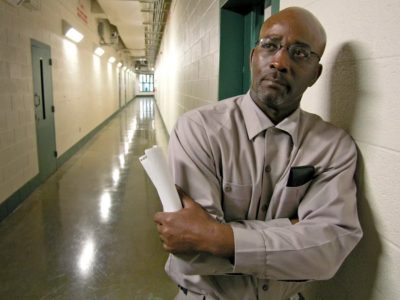 North Carolina man settles for millions after wrongful conviction, 44 years in prison. By AP and NPR
North Carolina man settles for millions after wrongful conviction, 44 years in prison. By AP and NPR
Ronnie Long stands in a hallway at the Albemarle Correctional Institution in Albemarle, east of Charlotte, N.C., in 2007. Peter Weinberger/AP
A man wrongfully convicted and imprisoned for 44 years has reached a $25 million combined settlement with a central North Carolina city and the state of North Carolina involving a lawsuit accusing authorities of misconduct, the man’s lawyers said Tuesday. Read more
Ethics / Morality / Religion
 Religion scholar on how Donald Trump has activated “the Christian enemies of democracy.” By Chauncey Devega / Salon
Religion scholar on how Donald Trump has activated “the Christian enemies of democracy.” By Chauncey Devega / Salon
David Gushee walks through the three stages in conservative Christian engagement with US culture that lead to Trump
I recently spoke with Gushee. He reflects on the still under-appreciated role that militant Christianity and the Christian right played in the Jan. 6 coup attempt and the attack on the Capitol by Trump’s MAGA followers. Gushee outlines how the Christian right and the neofascist MAGA movement came to be allied with one another in a mutual quest to end multiracial pluralistic democracy as part of an apocalyptic battle. Toward the end of this conversation, Gushee explains how a true Christian ethic is pro-democracy and can be mobilized against the neofascist authoritarian MAGA movement and the Christian right. Read more
Related: Trump Is Connecting With a Different Type of Evangelical Voter. Ruth Graham and
 The dilemmas of living in a post-religious world. By Shadi Hamid / Wash Post
The dilemmas of living in a post-religious world. By Shadi Hamid / Wash Post
Was 2023 a “good” year? I suppose it depends on what we mean by the word. A good year must be part of a good life, yet the question of what makes a life good, meaningful and whole is an increasingly challenging one — implicating as it does all the big categories: religion, family, love and politics. What makes it harder is that these categories increasingly blend together, for better and worse.
Modern liberalism is alluring, even if it might not always be good for us. As political scientist Patrick Deneen notes in “Why Liberalism Failed,” by dismantling traditional structures, liberalism encourages “privatism.” The individual becomes society’s most important unit, and the state’s role is somehow both reduced and expanded to the task of removing limitations on the individual’s ability to pursue their personal desires. This ability — fairly novel in human history — can prove overwhelming. Read more
 ‘The Book of Clarence’: Biblically inspired film mixes faith and farce. By Michael O’Sullivan / Wash Post
‘The Book of Clarence’: Biblically inspired film mixes faith and farce. By Michael O’Sullivan / Wash Post
LaKeith Stanfield plays a streetwise hustler in the shadow of Jesus
With “The Book of Clarence,” British musician-turned-filmmaker Jeymes Samuel does for the biblical sword-and-sandal epic what he did for westerns in his feature debut, “The Harder They Fall,” a tongue-in-cheeky cowboy action film featuring a predominantly Black cast and a story loosely based on historical figures. The new film is a shot in the arm for a moribund genre. But as with Samuel’s 2021 Netflix release, which turned the tropes of the oater on their heads, the results are entertaining, sometimes riotously so, yet also decidedly mixed. Read more
Historical / Cultural
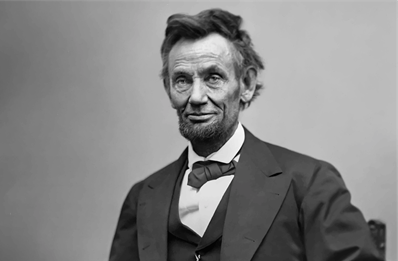 Lincoln’s Second Inaugural Address – Lincoln Memorial / National Park Service
Lincoln’s Second Inaugural Address – Lincoln Memorial / National Park Service
On March 4, 1865, only 41 days before his assassination, President Abraham Lincoln took the oath of office for the second time. Lincoln’s second inaugural address previewed his plans for healing a once-divided nation. The speech is engraved on the north interior wall of the Lincoln Memorial. Read more and Listen here
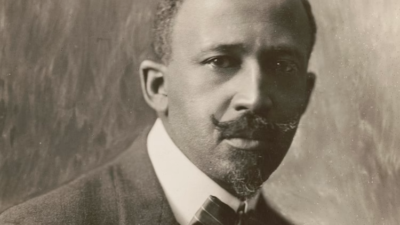 W. E. B. Du Bois on Black ‘Double-Consciousness.’ / The Atlantic August 1897 Issue
W. E. B. Du Bois on Black ‘Double-Consciousness.’ / The Atlantic August 1897 Issue
Between me and the other world there is ever an unasked question: unasked by some through feelings of delicacy; by others through the difficulty of rightly framing it. All, nevertheless, flutter round it. They approach me in a half-hesitant sort of way, eye me curiously or compassionately, and then, instead of saying directly, How does it feel to be a problem? they say, I know an excellent colored man in my town; or I fought at Mechanicsville; or, Do not these Southern outrages make your blood boil? At these I smile, or am interested, or reduce the boiling to a simmer, as the occasion may require. To the real question, How does it feel to be a problem? I answer seldom a word. Read more
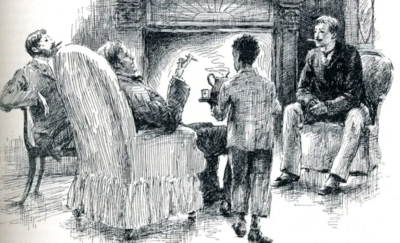 The Indoctrination of White People. By William Spivey / Good Men Project
The Indoctrination of White People. By William Spivey / Good Men Project
Why teaching the truth matters.
“I cannot tell a lie” was one of the first things we heard about America’s’ first President, George Washington. It was a fictional tale meant to impress us with Washington’s’ honesty and moral compass. It sounded better than the truth about George Washington, who worked for years to hunt down an escaped enslaved woman, Ona Judge, or that Washington’s’ dentures were partially made from teeth pulled from living slaves. Read more
 Why the New Great Migration Matters. By Beatrice J. Adams / AAIHS
Why the New Great Migration Matters. By Beatrice J. Adams / AAIHS
Image of a family from South Carolina in 1928 (Wikimedia Commons)
In the recent documentary “South to Black Power,” Charles Blow reaffirms his previous call for a “Second Great Migration.” His manifesto appeals to African Americans to return to the American South as a political strategy. However, the political reckoning he calls for has been ongoing since the late 1960s. While African American migration narratives typically trace migration from the American South, most African Americans still lived in the region even at the end of the Great Migration. Then, starting in the 1970s, African American migrants shifted their sights onto the region as they became “aware of the opportunities that have opened up in the South.”1 This new awareness fueled the start of one of the most significant events in twentieth century African American History—the start of the New Great Migration. Read more
 Descendants fight to maintain historic Black communities. By AP and NBC News
Descendants fight to maintain historic Black communities. By AP and NBC News
Sallie Ann Robinson stands in front of the Frances Jones Gullah House on South Carolina’s Daufuskie Island.Peter Frank Edwards / Redux
“I was born in this very house, as many generations of family have been as well,” said Robinson, a chef and tour guide. “I was raised here. These woods was our playgrounds.” Long dirt roads were once occupied by a bustling community that had its own bartering system and a lucrative oyster industry. “There were at one point over a thousand people living on this island,” Robinson said. Now, she and several cousins are the only ones of Gullah descent who remain. Historic Black communities like Daufuskie Island are dying, and descendants like Robinson are attempting to salvage what’s left of a quickly fading history. Read more
Related: Dispute of Black burial grounds in Bethesda reaches Md. Supreme Court. By Dan Morse / Wash Post
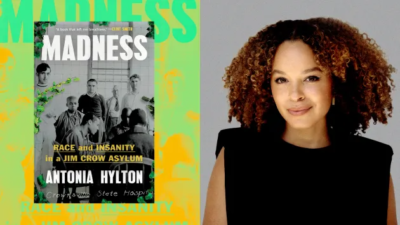 What It Was Like to Be a Black Patient in a Jim Crow Asylum. By Julia Metraux / Mother Jones
What It Was Like to Be a Black Patient in a Jim Crow Asylum. By Julia Metraux / Mother Jones
“You see a society that was comfortable discarding people.”
In March 1911, the segregated Crownsville asylum opened outside Baltimore, Maryland, admitting only Black patients. It was the first to house Black people in the state, but when they arrived, their main role wasn’t to get support—it was to build the asylum. In Madness, journalist Antonia Hylton details the institution’s treatment of Black patients—some placed there due to being orphans, seeking better treatment at work, or, in the case of one British man, because some white people found his accent to be suspect. Hylton discovered Crownsville as a university student, wanting to learn more about the history and experiences of people of color in mental health systems. Read more
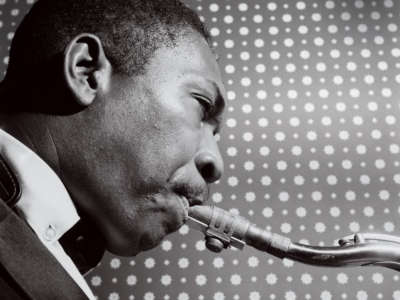 How John Coltrane’s ‘My Favorite Things’ Changed American Music. By Jeff MacGregor / Smithsonian Magazine
How John Coltrane’s ‘My Favorite Things’ Changed American Music. By Jeff MacGregor / Smithsonian Magazine
Looking back at the moment when one of our greatest jazzmen raised the stakes for everyone who came after
They gathered one afternoon in late October of 1960, at the Atlantic Records studios in a nondescript building at 234 West 56th Street in New York: pianist McCoy Tyner, just 21, a prodigy from Philadelphia; Steve Davis, upright bass, 31, also from Philly; and Elvin Jones, at 33 a veteran drummer who had played with everyone from Art Farmer and Pepper Adams to Gil Evans and Miles Davis. And then there was John Coltrane, 34, already widely acknowledged as the next great jazz saxophonist, following Charlie Parker’s death in 1955. The little band had been playing together since May. It was the first proper recording session for the John Coltrane Quartet—and it promptly produced one of the greatest moments in jazz history: Coltrane’s rendition of Richard Rodgers and Oscar Hammerstein’s “My Favorite Things.” A regular had recently shown Coltrane the sheet music one night at the Jazz Gallery, a club on St. Mark’s Place in the East Village, and Coltrane thought he could make something of it. Read more and listen here
 What ‘Rustin’ can teach us about fixing broken friendships. By Michele L. Norris / Wash Post
What ‘Rustin’ can teach us about fixing broken friendships. By Michele L. Norris / Wash Post
Bayard Rustin, leader of the March on Washington, in New York in 1963. (Eddie Adams/AP)
About halfway through a Netflix biopic about Bayard Rustin, architect and organizer of the 1963 March on Washington, a friend tells him, “Go get your friend back.” I’ll explain what that means in a moment, but first, a word about the titular character. The movie — simply called “Rustin” — casts light on a figure history has all but erased. Rustin was a gay Black man at the center of a civil rights movement that was, the film makes clear, headed up by leaders who routinely marginalized the contributions of women, gay people and young Americans who often wanted to move faster and deploy messages that were deemed too radical. Read more
Sports
 In the N.F.L. and at Big Companies, Diversity Playbooks Face Hurdles. Ken Belson and
In the N.F.L. and at Big Companies, Diversity Playbooks Face Hurdles. Ken Belson and
The league’s successes and struggles are playing out in hundreds of companies that have emulated its Rooney Rule in trying to hire more people from underrepresented groups. In 2007, Lovie Smith, left, and Tony Dungy became the first two Black coaches to face off in a Super Bowl.Credit…Barton Silverman/The New York Times
For a league in which roughly 70 percent of N.F.L. players are people of color, it has been a source of embarrassment that the vast majority of coaches and executives have historically been white. To diversify teams’ leaderships ranks, the N.F.L. has largely relied on the Rooney Rule, named for a Pittsburgh Steelers owner and adopted in 2003, which required every team to interview at least one person of color when hiring a head coach or general manager. Read more
 The Grizzlies were picking up the pieces with Ja Morant. Now he’s out again. By Ben Golliver / Wash Post
The Grizzlies were picking up the pieces with Ja Morant. Now he’s out again. By Ben Golliver / Wash Post
For three weeks, the Memphis Grizzlies got a taste of life with their franchise point guard, and it was sweet.
That’s why Monday’s news that Morant will undergo season-ending surgery to address a labral tear in his right shoulder landed with a thud: The Grizzlies were mincemeat without him and electric with him, and they will play out the remaining three months of a lost season fully aware of the stark difference. Read more
 5 iconic ads from Tiger Woods and Nike Golf’s 27-year partnership. By Diba Mohtasham / NPR
5 iconic ads from Tiger Woods and Nike Golf’s 27-year partnership. By Diba Mohtasham / NPR
After nearly three decades, Tiger Woods’ memorable run with Nike Golf has ended. The two sides announced the end of their partnership on Monday, bringing to a close one of the most memorable advertising tandems in the history of sports.
“Over 27 years ago, I was fortunate to start a partnership with one of the most iconic brands in the world,” Woods said in a statement. “The days since have been filled with so many amazing moments and memories.” The most recent 10-year agreement between Woods and Nike was reportedly worth about $200 million, but perhaps the most enduring legacy of the partnership was the advertisements. Read more
 Phil Gordon spent decades helping poor kids become champions in tennis and in life. By Dwayne Bray / Andscape
Phil Gordon spent decades helping poor kids become champions in tennis and in life. By Dwayne Bray / Andscape
Longtime tennis coach Phil Gordon (center) with some of his current students. From left to right: Brayden and Kyrie Freeman, Jameer Freeman, Tricia DeLorso (an employee of the Bloomfield Tennis Center), Jada Freeman and Yuri Freeman. Tony Spinelli for Andscape
Gordon used the sport to help them build self-esteem as well as learn composure, strategic thinking and etiquette. Many of his students took what they’ve learned from Gordon and used it to lift their families a rung up the economic ladder. His brightest pupils leveraged it into college scholarships. We’re talking everything from small liberal arts colleges, schools such as Brown and Princeton in the Ivy League, and Power 5 schools such as Stanford, University of Southern California and the University of Florida. Read more
Site Information
Articles appearing in the Digest are archived on our home page. And at the top of this page register your email to receive notification of new editions of Race Inquiry Digest.
Click here for earlier Digests. The site is searchable by name or topic. See “search” at the top of this page.
About Race Inquiry and Race Inquiry Digest. The Digest is published on Mondays and Thursdays.
Use the customized buttons below to share the Digest in an email, or post to your Facebook, Linkedin or Twitter accounts.